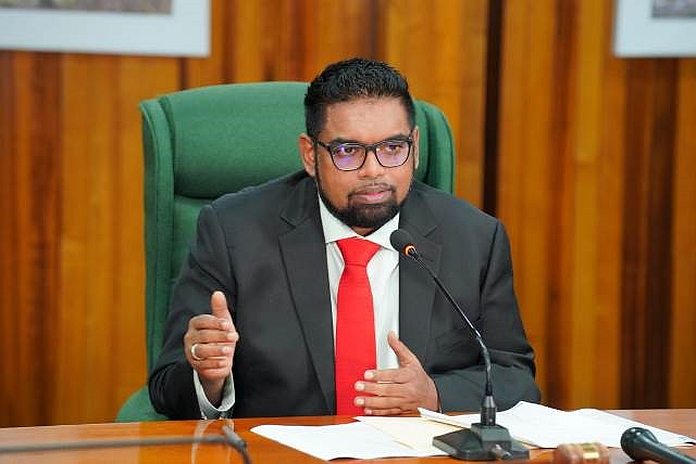– Government working on a holistic immigration policy
GEORGETOWN, Guyana, (DPI) – His Excellency Dr Irfaan Ali called regional integration a fundamental pillar of Guyana’s economic development while speaking at a virtual panel discussion Monday, April 4, 2022.
The event, organised by the Global Business Leadership Forum, was chaired by the executive director of the Caribbean Export Development Agency, Deodat Maharaj, and included other organisations from North America.
The president said that CARICOM has “enormous” economic potential and that Guyana is willing to provide a platform through which investors can realise such. He also mentioned upcoming events to facilitate this, including the country’s hosting of the region’s Agriculture Investment Forum in May.
United region
The president said that although Guyana’s Oil and Gas Sector continues to make the headlines, his Government remains committed to developing “a well-diversified” economy that will lead to a sustainable path to prosperity.
“Not only country prosperity but people prosperity, and a country that brings the region together and contributes significantly to regional prosperity. There is a difference between economic development and financial prosperity. We do not want people to have financial prosperity without economic development.”
The president explained that while trade barriers still exist between CARICOM nations in a “major way”, recently, there has been a greater push to remove them. He also used the opportunity to highlight the economic prowess of Guyana’s traditional sectors as well as the issues that the country has faced in the past in realising its development priorities.
“For me, oil and gas is just a catalyst to do the very things that could have been done decades ago.”
People transformation
The head of state said that one of the most powerful tools that Guyana has produced is its human resources.
“People who are brilliant, people who understand issues and people who are able to not only help Guyana but to go all over the world and shine.”
He said that Guyanese must prepare themselves for the impending opportunities.
“We’re not talking today only about preparing our young people for the oil and gas sector. We want every single primary school student to have elementary training in coding and software development. By the time you get up to secondary school, you must be doing serious work on becoming specialised or becoming specialists in software creation and development.”
He said that school curriculums have to change to reflect the dynamism of the new path that the country is on.
“So, in the people’s transformation, education is the foundational pillar, ensuring that every Guyanese has access to the best possible education…education to develop analytical thinking, education to develop transformational thinking, education to develop not only our understanding of an issue or comprehension of an issue but our critical thinking path – that is the type of education that we were talking about.”
President Ali also expounded on the country’s healthcare system and said that Guyana is not only aiming to provide the best healthcare to its population but also to the entire CARICOM region. He added that the country is also aiming to enhance its education and healthcare systems to earn funds.
The president said that another aspect of transformation is “futuristic transformation”, which will not only encompass building the economy for now and the future but will be driven by, among other things, technology (such as robotics), an energy corridor and food security.
Immigration policy
To support the country’s current development trajectory, it was announced that the government is working on a holistic immigration policy.
This, he said, is because the country has found itself in a position where there is a net loss of labour.
“I had a meeting on Friday with the contractors, and they’re all behind schedule now because they can’t find labour. They can’t find workers, and this is a major problem that we’re going to be faced with. Some may say it’s a good problem to have, but it’s a very troubling problem. So, we are working now on a holistic immigration policy, not only for the diaspora but understanding critically what the demand will be in three years, five years and ten years.”
The president added that a leading expert has been hired in the area that will work along with the country’s local team to examine the issue and provide an analysis that will be used to form a policy.
“We need people badly and we need them now, and with the type of infrastructure that we’re investing in, the type of healthcare service we’re investing, the type of education services that we’re investing in, guess what? Those services, when they’re fully built out in five years to ten years, will require people to consume the service.”





